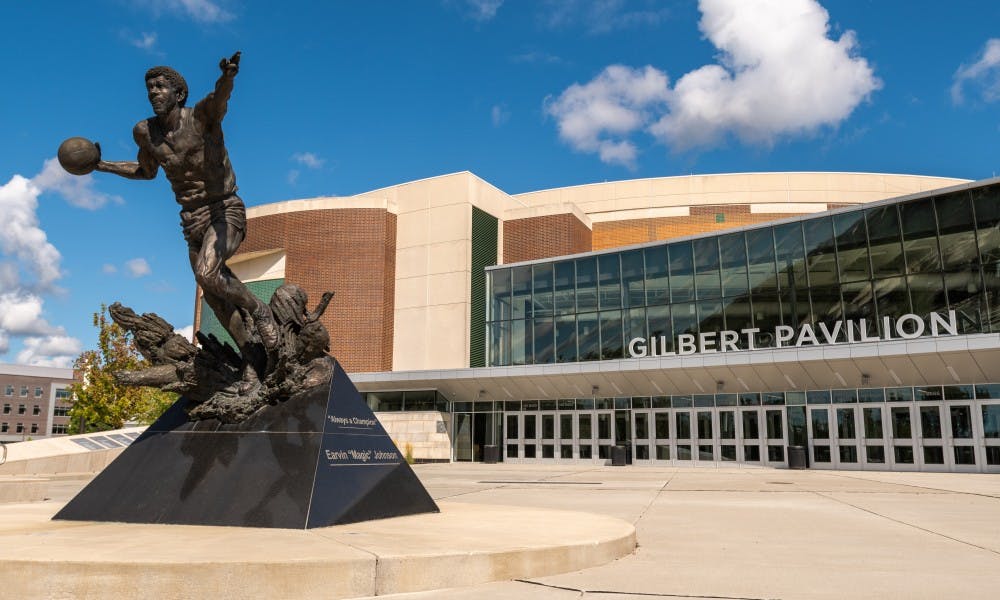What will you be doing on a Sunday in late February, a full six months from now, at 1 p.m.? What about four nights later, a Thursday, at 6:30 p.m.?
For the schedule makers who coordinate every Big Ten men’s and women’s basketball game every season, they have to know every single detail, months in advance. The process starts the previous February, when Kerry Kenny, at the Big Ten office in New York, uses a computer program to decide which of the 14 teams will be playing who, how many times, and where.
“Scheduling is an art and a science,” Kenny said.
The issue of what date the games are played on doesn’t enter into the equation until much later, in June, when the Big Ten’s four broadcast partners — ESPN, CBS, Fox, and the conference-owned Big Ten Network — draft all 140 men’s and women’s games.
For example, a game like Michigan State’s regular season Big Ten championship-clinching home victory over Michigan from last March would be drafted very early in the process, in that case, by ESPN. The rivalry combined with the national interest in recognizable programs, coaches and players guarantees ratings. And ratings are king.
Certain networks drafting a game influences the date the game will be played on. CBS only broadcasts college basketball on Sunday afternoons. Fox has begun broadcasting Friday night games, with MSU’s February trip to Iowa last season its highest-rated ever.
Once that is decided, the exact dates are subject to blackout from the venues themselves. Some arenas at smaller Big Ten schools host other sports in addition to men’s and women’s basketball, such as wrestling, volleyball and gymnastics. Cooperation is necessary between the universities themselves and the conference office, or else you could end up with a nightmare scenario where multiple events are scheduled to take place at the same time in the same venue.
Tom Izzo, former Michigan coach John Beilein and others have called for protected rivalries like Michigan-Michigan State and Indiana-Purdue to always close the season, similar to the way Duke and North Carolina do in the Atlantic Coast Conference. Kenny was asked if that was something the conference was in favor of.
“The good news is, with moving to the 20-game schedule (the Big Ten now plays 20 conference games as of last season instead of 18, as it had been since the last round of expansion), you have the three in-state rivalries — Michigan-Michigan State, Indiana-Purdue, Illinois-Northwestern, where they are going to play a home-and-home every year,” Kenny said. “So that’s something where we heard that feedback, administrators and coaches, we heard that feedback as well, so that’s something that we wanted to make sure happened.
“In terms of the final game of the year for some of the rivalries, particularly those three, it’s definitely something that we’re looking into … The one thing that prevents us from locking it in in advance is our four TV partners. We just have to see how games are selected through our draft process, and if the games are selected in a way that prevents us from being able to do it, then we won’t be able to do it. But we’re definitely trying to make every effort.”
The university is in charge of setting their own non-conference schedule, and that job falls to Assistant Athletic Director Kevin Pauga. He manages MSU’s annual participation in marquee events such as the Champions Classic (a season-opening game against either Duke, Kentucky, or Kansas in a rotating venue), the Big Ten-ACC Challenge, and the Gavitt Games, an on-campus challenge between the Big Ten and the Big East. These games are set by conferences and TV networks, meaning the dates are set in stone and Pauga cannot schedule a different non-conference game in those timeframes.
Pauga also works to put the Spartans in a banner event over the Thanksgiving holiday. The Spartans will return this November to the Maui Invitational for the first time in ten years, but have played in recent years in tournaments such as the Las Vegas Invitational, PK80 in Portland, and Battle 4 Atlantis in the Bahamas.
Just with those major games alone, which typically consist of games between major competition, six of MSU’s 11 non-conference games are accounted for. The other five are the discretion of Pauga, where he has to find five “guarantee games:” games where a smaller team, such as Florida Gulf Coast or Green Bay is paid a fee by MSU to come to Breslin Center, where they will be a heavy underdog to the typically dominant Spartans.
“You’re really kind of shopping around to play matchmaker, and seeing what dates work,” Pauga said. “There’s all sorts of reasons as to why a certain game ends up on a certain day.”
Once the schedule is set, and the months of work are over, people like Kenny and Pauga can sit back and watch basketball.
Just like you and me.
Support student media!
Please consider donating to The State News and help fund the future of journalism.
Discussion
Share and discuss “How Michigan State men’s basketball schedule is created by the Big Ten” on social media.









